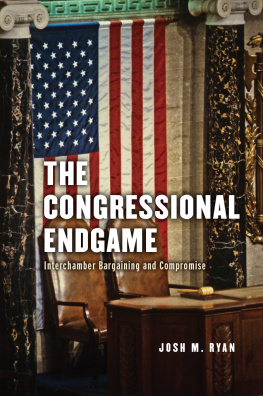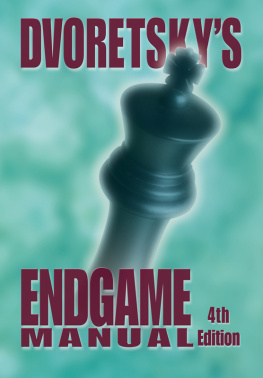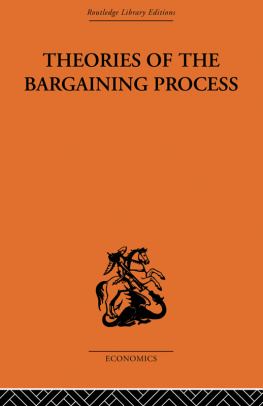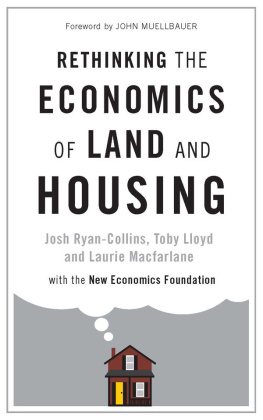The Congressional Endgame
The Congressional Endgame
Interchamber Bargaining and Compromise
JOSH M. RYAN
THE UNIVERSITY OF CHICAGO PRESS
CHICAGO AND LONDON
The University of Chicago Press, Chicago 60637
The University of Chicago Press, Ltd., London
2018 by The University of Chicago
All rights reserved. No part of this book may be used or reproduced in any manner whatsoever without written permission, except in the case of brief quotations in critical articles and reviews. For more information, contact the University of Chicago Press, 1427 E. 60th St., Chicago, IL 60637.
Published 2018
Printed in the United States of America
27 26 25 24 23 22 21 20 19 18 1 2 3 4 5
ISBN -13: 978-0-226-58206-1 (cloth)
ISBN -13: 978-0-226-58223-8 (paper)
ISBN -13: 978-0-226-58237-5 (e-book)
DOI : https://doi.org/10.7208/chicago/9780226582375.001.0001
Library of Congress Cataloging-in-Publication Data
Names: Ryan, Josh M., author.
Title: The congressional endgame : interchamber bargaining and compromise / Josh M. Ryan.
Description: Chicago ; London : The University of Chicago Press, 2018. | Includes bibliographical references and index.
Identifiers: LCCN 2018019132 | isbn 9780226582061 (cloth : alk. paper) | ISBN 9780226582238 (pbk. : alk. paper) | ISBN 9780226582375 (e-book)
Subjects: LCSH: United States. CongressConference committees. | United States. CongressResolutions. | LegislationUnited States. | United StatesPolitics and government.
Classification: LCC JK 1111 . R 93 2018 | DDC 328.73/0775dc23
LC record available at https://lccn.loc.gov/2018019132

This paper meets the requirements of ANSI / NISO Z 39.48-1992 (Permanence of Paper).
Contents
I wish to thank my colleagues at Bradley University, where I began this project, and at Utah State University, where I completed it. At Bradley, I am especially grateful to Ed Burmila, Tom Carty, and Lori Wiebold, each of whom provided substantive suggestions and encouragement. At Utah State, I owe Damon Cann, Robert Ross, Anna Pechenkina, Laura Gamboa, and Michael Lyons a debt of gratitude. Greg Goelzhauser entertained my sometimes long-winded questions and always offered thoughtful advice on various aspects of the project.
Thanks also go to numerous others who read versions of the manuscript over the last few years. Scott Adler, Anand Sokhey, Ken Bickers, and Scott Wolford have each helped me mature as a scholar, and I am indebted to their guidance. Greg Koger, Jim Curry, Phil Arena, Mike Crespin, and Nate Monroe all offered helpful comments on various chapter drafts. Jon Rogowski, Rob McGrath, Dave Doherty, Mike Touchton, Scott Minkoff, and Jeff Lyons kept me motivated via phone conversations, email exchanges, and not-frequent-enough get-togethers. All of these people are brilliant political scientists; more importantly, I am privileged to call them friends.
The University of Chicago Press has made the process as enjoyable and painless as possible. I owe thanks to my editor, Charles Myers, and his entire staff. Chuck not only made valuable comments on the manuscript but answered all of my questions with patience and thoughtfulness. He also guided the book through a very useful review process.
I would not have finished the project without the support of my family, Greg and Sue Ryan, and my brother, Sean Ryan. They have given me unending support during this process. Finally, my partner Kristin has put up with my stress, complaints, and frustrations with incredible optimism and enthusiasm. Her interests do not include political science, and for that I am very grateful.
Does Bicameralism Work in the Modern Congress?
People are trying to remain open for negotiation, but I dont really know how we ever reconcile where the House is and where the Senate is.
Sen. Mary Landrieu, speaking about climate change legislation, June 23, 2009
After not being able to agree, the process looked dead until the party leadership advanced the idea of skinny repeal, a bill that, among other things, would have repealed the ACAs mandate that Americans must purchase insurance on the private market. The bill avoided other controversial topics, such as cuts to Medicaid, but most policy experts agreed that it would have destabilized the health care market, potentially causing the system to collapse.
The idea behind skinny repeal was to pass something to move the chambers to a conference committee, where the details could be hammered out and, eventually, a take-it-or-leave-it offer could be sent back to both chambers. Lindsey Graham, Republican from South Carolina, called the bill reassured the senators enough that both Graham and Johnson ended up voting for the bill hours later, though John McCain, along with Senators Collins and Murkowski, cast dramatic no votes that sank the plan.
The Senate was right to be concerned. Skinny repeal would have given the House majority much of what it wanted. If policy experts were correct, and the Obamacare markets collapsed, the law would have effectively been repealed. The bill also prevented the House from taking additional tough votes on specific, popular provisions and placed much of the blame on the Senate. Procedurally, this would not have been all that uncommon. The chambers frequently pass legislation without modifying the bill, especially when postpassage bargaining is likely to be difficult and costly. Even if the House agreed to conference, there was no guarantee the committee would produce a satisfactory compromise, and the House could have then voted for skinny repeal. Despite these important policy implications, there is, at present, little theory that offers guidance on how these different paths to resolution might work, and what types of policy might be produced.
Or, consider the 2014 Farm Bill, which was successfully enacted after a conference committee. The Farm Bills reauthorization is not the type of legislative activity that typically attracts media headlines. The bill, which must be passed every five years, is Congresss main vehicle for agricultural and food policy and is an important, if wonkish, legislative item. Among other things, each Farm Bill renewal manages crop subsidies and insurance programs, implements trade regulations that allow American crops to be sold overseas, and imposes environmental and conservation regulations on farmers. Passage has traditionally been bipartisan because the bill authorizes spending for key constituencies across many legislative districts and because it does not deal with any hot-button social issues. The 2002 version of the bill, enacted only a few weeks after the previous version expired, passed with 280 votes in the House and 64 votes in the Senate and was approved in both chambers after a conference committee negotiated the bill for about three months. Most of the opposition to the
The 2014 process, by contrast, took over two years to complete and faced stiff opposition from members of both parties in the House and Senate. Because of a historical need to generate urban support for farm programs and rural support for a poverty-based food program, the Department of Agriculture is responsible not only for farm policy but also for implementation of the federal food stamp program known as the Supplemental Nutrition Assistance Program (SNAP). In fact, in 2014, the SNAP program was by far the largest portion of Farm Bill spending, responsible for about $756 billion of the overall bill cost of $956 billion. In 2014 both chambers agreed on cutting funding for SNAP but disagreed strongly about how much to cut. The Democratic-led Senate, as is typical, substituted their own language into the House-passed version of the bill and agreed on a cut of about $4 billion while the Republican-led House had previously cut food stamp funding by nearly $21 billion. For months, the chambers could not even agree to meet, and the bill languished without action during the summer and fall of 2013.
 This paper meets the requirements of ANSI / NISO Z 39.48-1992 (Permanence of Paper).
This paper meets the requirements of ANSI / NISO Z 39.48-1992 (Permanence of Paper).











